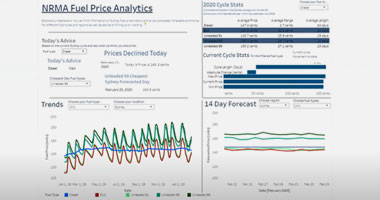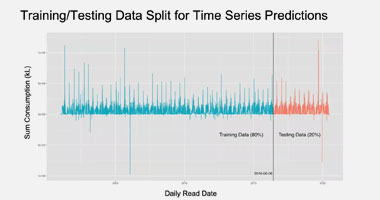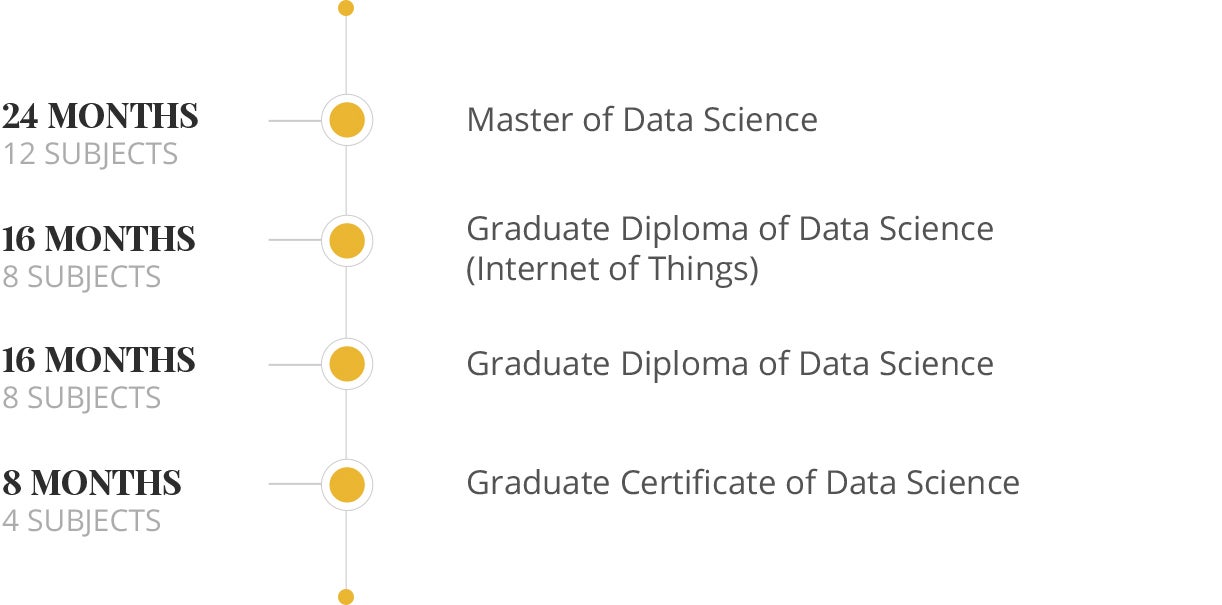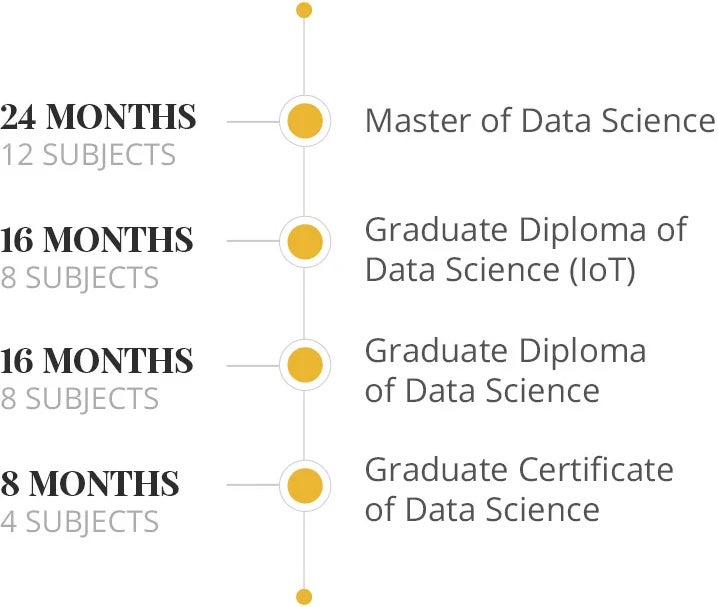
Why Data Science with JCU?
The JCU Online Master of Data Science is designed to put professionals who recognise the power of data and numbers ahead of the pack. The JCU Master of Data Science is backed by an Industry Advisory Board, made up of data science and tech leaders from across Australia with extensive experience both domestically and abroad.
100% online & part-time
Fast-track your career with flexible study you can balance around your life. Study one subject at a time wherever and whenever suits you.
Graduate with proof of capability
Build a portfolio to showcase your newfound capabilities through capstone projects and masterclasses.
Gain skills the industry needs
Develop skills in a suite of programming languages and software including Python, R, Tableau and AWS and study the only online Master of Data Science in Australia to be SAS certified.
Program Highlights
- Develop fundamental skills in data science.
- Open up your career opportunities.
- Build your portfolio.
- Gain skills in SAS, Python, R and more.
- Fast-track your career with 100% online study.
- Be supported by a dedicated Student Success Advisor.
Learn while you work
Hands-on experience: Data science student projects
With JCU Online, you will build a portfolio to demonstrate your expertise. See some examples from our students below.

Ubot: Robot harvesting
Create MobileNetV3 model using UBOT provided annotated citrus images. Compare with provided UBOT citrus detection mask RCNN model and compare detection accuracy and detection speed performance.
VIEW STUDENT PRESENTATION
Fuel price cycles in NSW: NRMA
To build a statistical model that will identify fuel price cycles in New South Wales (NSW) for the National Roads and Motorists’ Association (NRMA), provide diagnostics around movements and visualise in a dashboard.
VIEW STUDENT PRESENTATION
Cairns regional council water monitoring
Conduct an analysis and visualisation of Council’s customer water meter data (1997 – 2018) for the purposes of gaining and developing insights to inform Council’s review of its Demand Management Strategy and better understand growth expansion areas.
VIEW STUDENT PRESENTATIONProgramming languages and software used



Succeed in a data-driven world and become SAS® Certified
The rapid growth of the data science field, and the increased demand for data scientists who are able to uncover the value in the data, is opening up opportunities in Australia and around the world. Delivered by leading experts with a deep knowledge of contemporary data theory and real-world industry experience, JCU’s online Master of Data Science provides the foundation you need to thrive in a data-driven world.
You’ll also gain industry-recognised skills - JCU has partnered with SAS®, analytic software provider and leader in Data Science. The Master of Data Science will prepare you to become a SAS® Certified Big Data Professional Using SAS®9.
What you will study
You will study up to 12 online subjects, depending on your entry point and recognition of prior learning. There are six subjects offered each year. Study periods are seven weeks long, with new subjects starting every second month.
You’ll gain expert skills in programming languages including Python and R, professional capability in visualisation tools such as SAS and Tableau, software development platforms like R-Studio and Jupyter and experience on cloud computing platforms including Amazon Web Services.
An interdisciplinary approach means you’ll acquire relevant knowledge from across the mathematics, information technology and business domains, delivered by experts in research, academia, business and of course, data science. This varied approach delivers a flexible knowledge base and skillset, adding weight to employability.
Want more details about these subjects? Find out more from our course guide.
*Duration dependent on individual study path and subject availability. Please speak to an Enrolment Advisor for more information.
-
Foundations for Data ScienceThis subject provides an overview of data science as a discipline, as well as an introduction to fundamental aspects of this area. Read more
-
Statistical Methods for Data ScienceThis subject introduces practical applications and concepts involved in descriptive statistics, inferential statistics and linear modelling. Read more
-
Data VisualisationThis subject introduces the fundamentals of data visualisation and how it can solve a wide range of practical data interpretation problems. Read more
-
Database SystemsThis subject provides an introduction to the principles and concepts of database systems and their importance in data science. Read more
-
Programming and Data Analytics using PythonThis subject introduces fundamental principles and practices of computer programming with Python. Read more
-
Essential Mathematics for Data ScientistsThis subject provides the essential elements of mathematics required for data scientists. Read more
-
Introduction to Data MiningThis subject will provide an understanding of a range of widely used algorithms and techniques to automatically extract patterns and models from data. Read more
-
Visual Analytics for Data Scientists using SASThis subject introduces students to practical applications and concepts involved in advanced statistical modelling in SAS. Read more
-
Data Science Master Class 1This subject brings in leaders in the field to report recent advances in data science techniques and/or applications of data science. It will also explore natural language processing (NLP), web scraping and APIs to harvest data with Python. Read more
-
Advanced Data Management and Analysis using SASThis subject introduces the cutting edge tools and techniques for high-performance and large-scale computing. Read more
-
Data Science and Strategic Decision MakingThis subject provides integrated knowledge for understanding and managing information resources, building basic business intelligent systems, interpreting business statistics and developing practical decision models. Read more
-
Data Mining and Machine LearningThis subject provides a range of algorithms based on machine learning techniques for advanced data analysis and mining. Read more
- Entry Requirements
- Recognition of Prior Learning
- Learning Outcomes
- Career Outcomes
- Inherent Requirements
The Master of Data Science welcomes applications from students who are able to meet the following criteria:
- A Bachelor degree (whilst not a prerequisite for entry, high numeracy skills equivalent to senior level mathematics that includes algebra and elementary differential calculus is assumed); OR
- At least five years of relevant work experience in an IT or data science-related industry. Industry experience will need to include some background in computing, data analysis or programming. Application based on relevant industry experience must be supported by a detailed CV and proof of work experience.
Applicants of non-English speaking backgrounds must meet the English language proficiency requirements of Band 2 – Schedule II of the JCU Admissions Policy.
*JCU offers a specified online mathematics subject, which can be completed prior to application if you do not currently meet the mathematical entry requirement level.
Not sure if you meet these entry criteria? Our Enrolment Advisors can assist you.
SPEAK WITH AN ENROLMENT ADVISORJCU recognises the value of past study and real-world experience. Exemptions or credits for elective subjects will be considered on a case-by-case basis, upon submission of verifiable supporting documentation.
GET IN TOUCH WITH AN ENROLMENT ADVISOR TO FIND OUT MOREOn successful completion of the Master of Data Science, graduates will be able to:
- Integrate and apply an advanced body of practical, technical, and theoretical knowledge, including understanding of recent developments and modern challenges, in Data Science and its application.
- Retrieve, analyse, synthesise and evaluate complex information, concepts, methods, or theories from a range of sources.
- Plan and conduct appropriate investigations of data sets by selecting and applying qualitative and quantitative methods, techniques and tools, as appropriate to the data and the application.
- Analyse requirements, and demonstrate effective applications of appropriate computing languages and computational tools for data acquisition, queries, management, analysis and visualisation.
- Identify, analyse and generate solutions for complex problems, especially related to tropical, regional, or Indigenous contexts, by applying knowledge and skills of data science with initiative and expert judgement.
- Communicate data concepts and methodologies of data science as well as the arguments and conclusions of the application of data science, clearly and coherently to specialist and non-specialist audiences through advanced written and oral English language skills and a variety of media.
- Respond appropriately to issues of data security, privacy and, where appropriate, regulatory requirements and cultural frameworks to work effectively, responsibly and safely in diverse contexts.
- Reflect on current skills, knowledge and attitudes to manage their professional learning needs and performance, autonomously and/or in collaboration with others.
- Apply knowledge of research principles, methods, techniques and tools to plan and execute a substantial research-based project.
The field of data science continues to grow, and studying a Master of Data Science will give you an edge in this diverse industry. Upon successfully completing a Master of Data Science with JCU, you will have the skills and expertise to succeed in roles like:
- Data Scientist
- Business Analyst
- AI Developer
- Machine Learning Specialist
- Data Analyst
- Chief Information Officer
According to Seek, the most common salary for a Data Scientist is $130,000¹. The Talent Data Science & Analytics Market Snapshot & Salary Guide states the most in-demand skills in this field include programming languages like SQL, Python and R, business analytics and machine learning², all of which you will learn in JCU Online’s Master of Data Science.
¹ Seek.com - Data Scientist
² Talent Data Science & Analytics Market Snapshot & Salary Guide.
DOWNLOAD COURSE GUIDEInherent requirements are the identified abilities, attributes, skills, and behaviours that must be demonstrated, during the learning experience, to successfully complete a course. These abilities, attributes, skills, and behaviours preserve the academic integrity of the University’s learning, assessment, and accreditation processes, and where applicable, meet the standards of a profession.
All JCU students have the opportunity to demonstrate, with reasonable adjustments where applicable, the inherent requirements for their course.
Nested qualifications: Early entry exit options
You can also build towards your master’s degree through flexible entry and exit points and ‘qualify as you go’ through our nested qualifications. As you study your Master of Data Science, you will gain your Graduate Certificate and Graduate Diploma of Data Science. If you need to finish your study early, you may still qualify for a Graduate Certificate or Graduate Diploma. Get in touch with an Enrolment Advisor to find out more.



Your personalised Enrolment Advisor
The role of an Enrolment Advisor is to ensure that you have all the resources and academic support needed to be successful in your studies.
Enrolments Advisors are here to help you with:
- Determining your eligibility for the course.
- Understanding the structure of your course and what you can expect to learn.
- Time management strategies for success.
- How to apply for financial assistance and FEE-HELP.
- Any questions you have about your application.
Contact hours for your Enrolment Advisor
Monday and Tuesday: 8am-6pm (AEST)
Wednesday and Thursday: 8am-7pm (AEST)
Friday: 8am - 5pm (AEST)
You might also be interested in:
Frequently Asked Questions
Ready to get started?
Download a course guide
For more detailed and up-to-date information about your degree, including:
- Information about the course
- Course duration
- Fees
- Course descriptions
- What to expect from the course
Speak with an Enrolment Advisor
Investing in the right course for you is important to us and we’re here to help. Simply request a call back and will assist you with:
- Entry requirements
- Choosing right course
- How to apply and enrol
- How online study works
- Course duration and fees














